|
|
|
Sort Order |
|
|
|
Items / Page
|
|
|
|
|
|
|
| Srl | Item |
| 1 |
ID:
090360
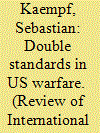

|
|
|
|
|
| Publication |
2009.
|
| Summary/Abstract |
This article investigates how - by breaking with the historical double standards regarding civilian protection in conflicts - by the end of the twentieth century, US warfare has come to comply with International Humanitarian Law (IHL). Yet, civilians are still being killed. This has sparked controversies over what constitutes legitimate targeting practices and as to whether higher levels of civilian protection could be achieved. Through an engagement with these debates, including an exploration of the evolution of the norm of non-combatant immunity with specific reference to US warfare, the article argues that IHL does not provide fully satisfactory answers to these issues as it is too permissive in relation to the killing of civilians. The article proposes that more stringent moral guidelines, such as those underpinning the idea of 'due care', have the potential to go much further in providing protection for the innocent in war.
|
|
|
|
|
|
|
|
|
|
|
|
|
|
|
|
| 2 |
ID:
090349
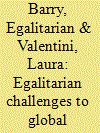

|
|
|
|
|
| Publication |
2009.
|
| Summary/Abstract |
Many political theorists defend the view that egalitarian justice should extend from the domestic to the global arena. Despite its intuitive appeal, this 'global egalitarianism' has come under attack from different quarters. In this article, we focus on one particular set of challenges to this view: those advanced by domestic egalitarians. We consider seven types of challenges, each pointing to a specific disanalogy between domestic and global arenas which is said to justify the restriction of egalitarian justice to the former, and argue that none of them - both individually and jointly - offers a conclusive refutation of global egalitarianism.
|
|
|
|
|
|
|
|
|
|
|
|
|
|
|
|
| 3 |
ID:
090358
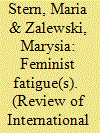

|
|
|
|
|
| Publication |
2009.
|
| Summary/Abstract |
In this article we critically consider the idea that feminism has performatively failed within the discipline of International Relations. One aspect of this failure relates to the production of sexgender through feminism which we suggest is partly responsible for a weariness inflecting feminist scholarship, in particular as a critical theoretical resource. We reflect on this weariness in the context of the study and practice of international politics - arenas still reaping the potent benefits of the virile political energies reverberating since 9/11. To illustrate our arguments we re-count a familiar feminist fable of militarisation - a story which we use to exemplify how the production of feminist IR is 'set' up to 'fail'. In so doing we clarify our depiction of feminism as seemingly haunted by its inherent paradoxes as well as explaining why it matters to discuss feminism within the locale of the academic study of international politics. We conclude with a consideration of the grammar of temporality that delimits representations of feminism and move to recast feminist failure as aporetic and concomitantly implicated in the process of intervening politically.
|
|
|
|
|
|
|
|
|
|
|
|
|
|
|
|
| 4 |
ID:
090354


|
|
|
|
|
| Publication |
2009.
|
| Summary/Abstract |
This article examines why states ask for forgiveness from other states or peoples that they have harmed. Asking for forgiveness has significant political, legal, and moral implications. But beyond these, the subject concerns how states confront their history and their collective responsibility for wrongdoing. My focus on the reasons states have for asking forgiveness could also improve our understanding of conflict resolution. The article introduces an innovative typology of requests for forgiveness by presenting important conceptual distinctions in the terminology currently employed in the field. Apologies, regrets, and expressions of sorrow are conceptualised as distinct avenues of asking forgiveness with varying degrees of significance and meaningfulness. I assert that the type of request for forgiveness is influenced by the degree of severity attributed to a wrongdoing and by the extent to which a state perceives its image as threatened by its wrongful act. The article analyses the important 1951 statement of West Germany's Chancellor Adenauer regarding the Jewish Holocaust as an example of a type of request for forgiveness.
|
|
|
|
|
|
|
|
|
|
|
|
|
|
|
|
| 5 |
ID:
090362
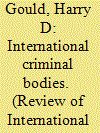

|
|
|
|
|
| Publication |
2009.
|
| Summary/Abstract |
One of the insights of Constructivism is that our world is, in part, made by what we say about it. We make things what they are by saying what they are. One way is through the use of metaphor; by asserting that one thing is another thing. Does our saying that a state is a person make it a person?
A way to intervene in this discussion is by addressing it not in the abstract, but guided by a cognate question: Can states commit crimes, a uniquely human act? If states can commit and be liable for crimes, they must be able to form intents. If they are indeed persons in the relevant sense, this is no problem; if their personality is trope, however, attribution of criminal responsibility becomes tenuous.
To analyse the issue, I trace the development of the trope of speaking of a group as if it were an individual from Roman Law, through to Hobbes, corporate law and IR Theory. Much hinges on Hobbes' elision of 'body' and 'person'. I conclude that it is too much to expect of a metaphor that it act, that it have reasons, beliefs, and desires, and that these sum to intentions.
|
|
|
|
|
|
|
|
|
|
|
|
|
|
|
|
| 6 |
ID:
090351


|
|
|
|
|
| Publication |
2009.
|
| Summary/Abstract |
Walzer has recently updated his just war theory to take account of terrorism, humanitarian military intervention and new interpretations of the doctrine of self-defence, pre-emptive and preventative warfare The ethical considerations that underwrite Walzer's most recent work invite us beyond the routine citation of his work to a proper consideration of the moral parameters of international politics. Beyond Just and Unjust Wars Walzer has a wealth of insight into the key questions of international theory. His work on toleration, the nature of universality or on the role of social criticism has always been the basis of his insight in to the hard questions of international ethics. Despite being heavily criticised for being communitarian or conservative (both charges that need serious re-evaluation) Walzer's ideas offer a real alternative to the dominant neo-Kantian cosmopolitan tradition and a workable ethical framework for thinking about the challenges of contemporary international politics and international law. Nowhere is this more apparent than in the final essay of Arguing About War. The essay, entitled 'Governing the Globe' offers a radical vision of a reformed international society inspired by the principles that underpin Walzer's development of his just war theory and it is vital that we take notice.
|
|
|
|
|
|
|
|
|
|
|
|
|
|
|
|
| 7 |
ID:
090359
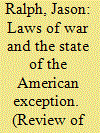

|
|
|
|
|
| Publication |
2009.
|
| Summary/Abstract |
This article examines the US response to the 9/11 terrorist attacks using Carl Schmitt's concept of the exception. It argues that the Bush administration's response is consistent with Schmitt's view, which argued that US policy continued the historical practice of drawing lines that separated 'civilisation' from zones of exception where the normal laws governing warfare did not apply. This suggests that the state of exception declared after 9/11 is not contingent on the rise and fall of the terrorist threat, rather it is the latest manifestation of 'global linear thinking' and therefore a permanent feature of American hegemony. However, the article does not accept this pessimistic conclusion. US policy since 9/11 fits squarely with a Schmittian explanation only because conservative nationalists have used the war on terror to help reconstruct a sense of American 'exceptionalism'. An alternative reading of how American liberalism should respond to terrorism can be found in the manner in which the Bush administration's policy was rejected by the US Supreme Court.
|
|
|
|
|
|
|
|
|
|
|
|
|
|
|
|
| 8 |
ID:
090356


|
|
|
|
|
| Publication |
2009.
|
| Summary/Abstract |
The 'liberal peace' is undergoing a crisis of legitimacy at the level of the everyday in post-conflict environments. In many such environments; different groups often locally constituted perceive it to be ethically bankrupt, subject to double standards, coercive and conditional, acultural, unconcerned with social welfare, and unfeeling and insensitive towards its subjects. It is tied to Western and liberal conceptions of the state, to institutions, and not to the local. Its post-Cold War moral capital, based upon its more emancipatory rather than conservative claims, has been squandered as a result, and its basic goal of a liberal social contract undermined. Certainly, since 9/11, attention has been diverted into other areas and many, perhaps promising peace processes have regressed. This has diverted attention away from a search for refinements, alternatives, for hybrid forms of peace, or for empathetic strategies through which the liberal blueprint for peace might coexist with alternatives. Yet from these strategies a post-liberal peace might emerge via critical research agendas for peacebuilding and for policymaking, termed here, eirenist. This opens up a discussion of an everyday 'post-liberal peace' and critical policies for peacebuilding.
|
|
|
|
|
|
|
|
|
|
|
|
|
|
|
|
| 9 |
ID:
090357
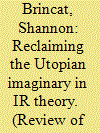

|
|
|
|
|
| Publication |
2009.
|
| Summary/Abstract |
This article aims to reinvigorate the utopian imagination as a vital and necessary component in IR theory. Since the First Great Debate between the Realists and the Utopianists (or more accurately, the Liberal-Internationalists) the utopian tradition has been viewed as being both subjective and arbitrary, leading to its dismissal as vain idealism in world politics. This article re-interrogates the arguments of Carr and Morgenthau and finds that they have relevance today only as against closed systems of utopia and have little bearing against the open-dialectical utopianism which is advocated here as a viable alternative to the sterility of realism. The article also examines the historical nexus between realism's dismissal of utopianism and the wider movements in political philosophy via a critical engagement with the works of Popper, Berlin and Arendt. Finally, after exploring the limitations of Booth's idea of 'Utopian Realism', the article argues that utopianism should no longer be assumed to be a blueprint for a future, perfect society, a tradition fraught with the danger of proto-totalisation, but as a critical imaginary that acts as a heuristic device to reveal the fissures in existing reality and as an ideational motivating force for progressive change in world politics.
|
|
|
|
|
|
|
|
|
|
|
|
|
|
|
|
| 10 |
ID:
090361
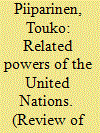

|
|
|
|
|
| Publication |
2009.
|
| Summary/Abstract |
The mainstream literature on the UN has been underlain by a methodological individualist philosophy, according to which all social phenomena, and particularly the functioning of all social institutions, should always be seen as resulting from the decisions of individual actors, as if the whole (organisation) was never more than the sum of its parts (members of an organisation). Such a fallacy has been denounced by social constructivist approaches which account for the existence of certain emergent properties of the UN, such as collective identity, which cannot be reduced to its constituent units, namely, states. These accounts, however, have offered a partial picture of the holistic understanding of the UN, as they have failed to comprehend, or perhaps simply ignored the causal powers of such emergent properties. This article enhances constructivist approaches by dint of the critical realist models of Synchronic Emergent Powers Materialism and Transformational Model of Social Activity. The value added of these two models in comprehending the powers associated with the UN Security Council lies in their ability to function as instructive metaphors; they allow for the independent and irreducible existence of certain mechanisms by which the Council controls international conflicts but nevertheless recognises that these can only emerge from the mutual interaction between agents (states) and structure (UN institutions).
|
|
|
|
|
|
|
|
|
|
|
|
|
|
|
|
|
|
|
|
|